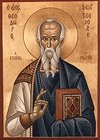Iconodule
An iconodule (also iconophile) is one who supports or is in favor of using religious images, specifically icons. Those who oppose the use of icons are called iconoclasts. The word iconodule comes from the Greek eikonodoulus, meaning "one who serves images."
The word was applied to those Orthodox Christians during the eighth and ninth centuries who defended the use of icons in opposition to the iconoclasts, who were against their use. This dispute arose generally over the literal interpretation of the Ten Commandments, one of which forbids the making and worshipping of "graven images," and during the rise of the teachings of Muhammad.
During the icon disputes of the eighth and ninth centuries, the principal institutions of iconodule support and icon veneration were the monasteries. A network of monks who supported icon veneration came into being, including John of Damascus and Theodore the Studite. Other iconodules within the Church included Germanus I of Constantinople and Pope Gregory III of Rome. Within the Byzantine nobility, the principal iconodule was the Empress Irene, the mother and regent for her son Constantine VI, who ended the first iconoclastic period and convened the Seventh Ecumenical Council that confirmed icon veneration.
Finally, in 843, the Empress Theodora, who was regent for her son Michael III, ended the second iconoclastic period begun by Emperor Leo V the Armenian, in 813. With Theodora's success, the iconodules maintained their position under the leadership of Patriarch Ignatius of Constantinople, who was patriarch from 847 to 858 and from 867 to 877. Since the time of the Proclamation of 843 restoring veneration of icons, the Orthodox Church has celebrated the feast of the Triumph of Orthodoxy on the first Sunday of Lent.
